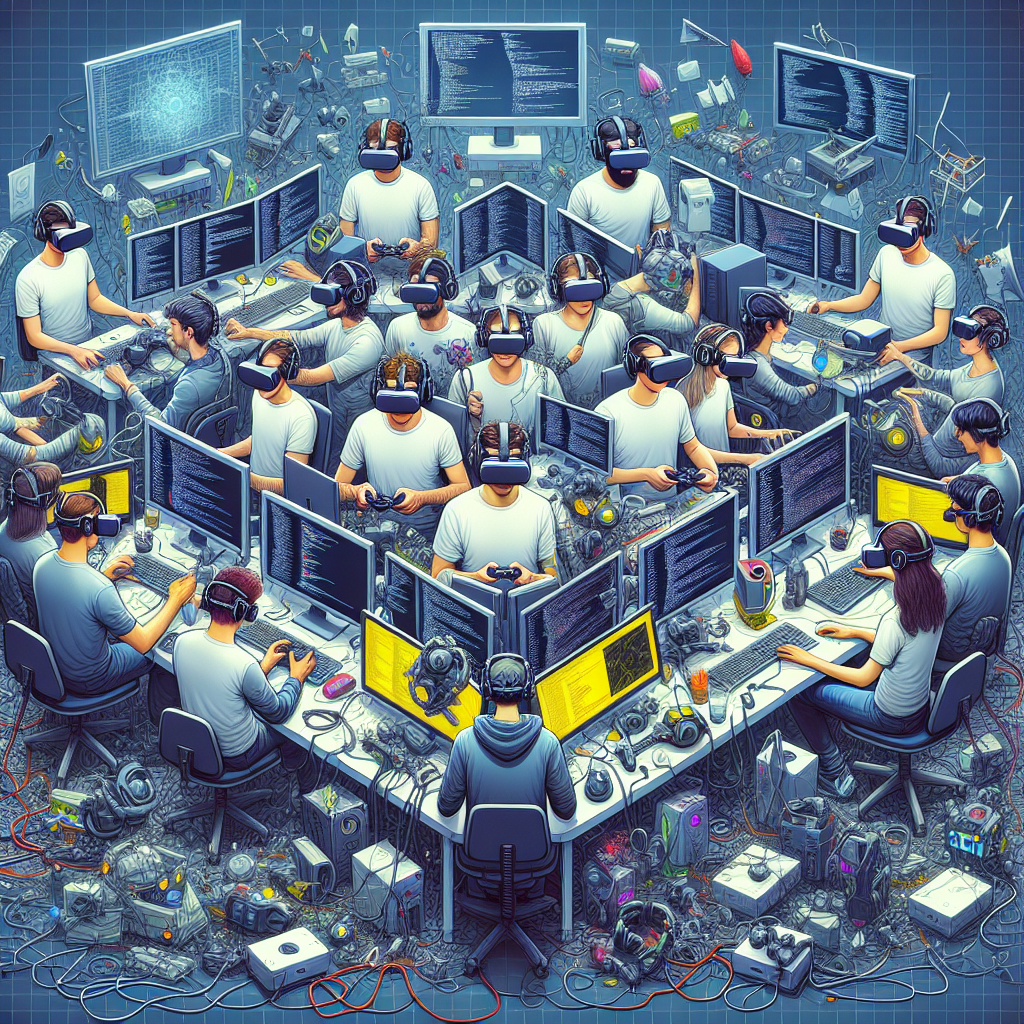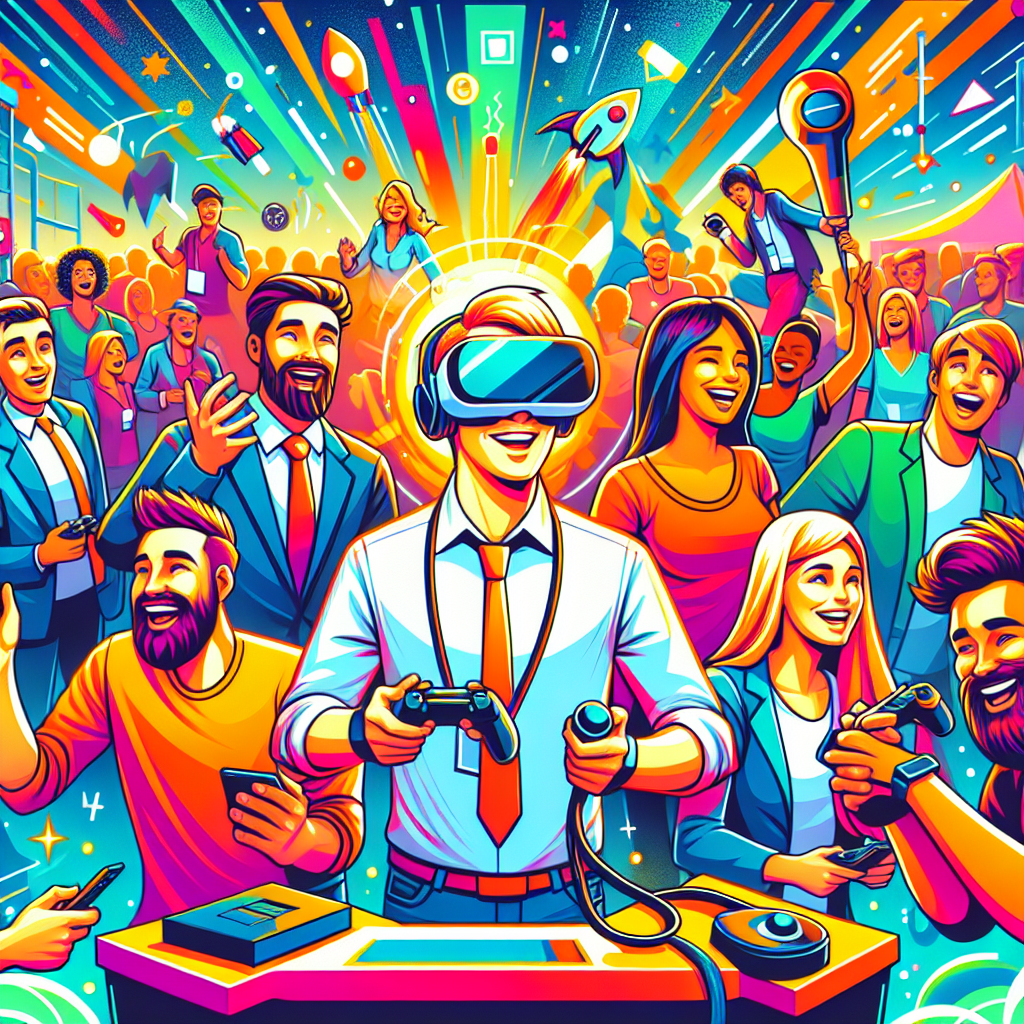
Are you ready to dive into the exciting world of virtual reality? ⭐ Creating a VR game can be a thrilling venture, but it also requires careful planning and execution. Whether youre a seasoned developer or a newcomer, understanding the basic steps in the development process is essential. Let’s break down what you need to know!
The journey starts with a solid concept. What’s your game about? From epic adventures to puzzle-solving, the theme will dictate your design choices. For instance, if you have an idea for an action-packed VR game featuring intergalactic battles, jot down every detail!
This phase can be often overlooked but is crucial. You need to consider:
Tools like Unity and Unreal Engine can assist you in this process. They are well-known for their powerful capabilities in designing immersive experiences.
Next up is prototyping! Building a prototype lets you test the gameplay mechanics while collecting feedback early in the process. For example, if you notice players struggling with navigation, you can adjust your control scheme before diving deeper into development.
Now comes the exciting part: coding! Whether it’s using C# with Unity or C++ with Unreal Engine, your coding will bring your ideas to life. ⭐ Don’t forget to account for:
Once your game is developed, rigorous testing is necessary. This helps find bugs and optimize performance. The goal is to ensure players have a seamless experience. An interesting statistic is that games that undergo thorough testing end up having 50% fewer bugs at launch compared to those that don’t.
It’s showtime! Launch your game on platforms like Steam or the Oculus Store. Create buzz around your launch with effective marketing strategies. Did you know that 68% of gamers prefer to try out games that friends recommend? So, word of mouth can be a significant factor in your success! ⭐
No game is perfect at launch, and that’s okay! Continuous updates and support can keep your players engaged. Monitor feedback and fix issues swiftly to ensure user satisfaction. Consider providing in-game events or rewards to sustain interest post-launch. ⭐
Let’s take Jane, a game developer who came to us with a brilliant idea but no technical know-how. She wanted to develop a VR game that simulated underwater exploration. By collaborating with our experts, including our customer relations manager, Arsenii, we guided her through the entire process—from conceptualizing to launching. Jane’s game became a hit, receiving praise for its stunning graphics and immersive gameplay!
If youre new to this field, consider these tips from industry veterans:
| Service | Estimated Cost (EUR) |
| Unity Development | 7,500 |
| Character Design | 2,000 |
| Animation | 3,000 |
| Sound Design | 1,500 |
| Beta Testing | 1,000 |
| Marketing | 2,500 |
| Updates & Support | 1,200 |
| Distribution Fees | 800 |
| Miscellaneous | 500 |
| Total Estimated Cost | 20,000 |
If you’re now bursting with excitement about creating a VR game, don’t hesitate! Contact us at +373 601 066 66 or visit our website at webmaster.md for a personalized consultation. With over 20 years of experience and a team of professional specialists, we guarantee a streamlined process from concept to support.

Jumping into the world of VR game development is exciting, but one of the first questions that pops up is: How much does it cost to develop a VR game? ⭐ Understanding your budget can make a significant difference in the success of your project. Let’s break it down step-by-step!
When we talk about the financial aspect of creating a VR game, the most substantial chunk of your budget typically goes toward development itself. Here’s a rough breakdown:
Once your game is developed, it needs to be seen! Marketing budgets can dramatically affect your launch success. Here’s a cost breakdown:
Your games launch is just the beginning. Consider budgeting for post-launch support to keep players engaged. Some potential costs include:
While the above costs cover core aspects, several other factors can influence your budget:
To give you a clearer picture, here’s a hypothetical budget summary for a simple VR game:
| Category | Estimated Cost (EUR) |
| Game Engine License | 1,500 |
| Development Hours (500 hours @ €50/hr) | 25,000 |
| Art and Asset Creation | 10,000 |
| Marketing and Promotion | 7,000 |
| Post-Launch Support | 3,000 |
| Hardware Costs (2 headsets) | 1,500 |
| Legal Fees | 1,500 |
| Total Estimated Cost | 50,000 |
As you can see, creating a VR game can cost upwards of €50,000 for a modest project, but the rewards can be well worth the investment! ⭐ Engaging gameplay and innovative use of technology can lead to significant returns.
If youre eager to explore the world of VR development but unsure where to start, were here for you! With over 20 years of experience and a dedicated team of professionals, webmaster.md offers comprehensive services that cover all aspects of VR game development. Before you kick off your project, why not reach out to us at +373 601 066 66 or visit us at webmaster.md? We can help you tailor the perfect budget for your specific vision!

The future is immersive, and the potential of virtual reality (VR) in business is undeniable. ⭐ If you haven’t yet considered creating a VR game as part of your marketing or engagement strategy, now is the time! Let’s dive into why every business should get involved in this exciting realm.
VR games provide a unique platform for engaging with customers in ways traditional mediums simply can’t. For example, companies like IKEA have developed VR applications that allow customers to visualize furniture in real-time, leading to a more informed purchasing decision. ⭐️ This level of interaction can significantly enhance customer loyalty and satisfaction.
Imagine transporting potential clients right into your brand’s universe. Creation of a VR game can allow users to experience your products or services interactively. Take the automotive industry, for instance; brands like Audi offer VR test drives, giving customers a thrilling behind-the-wheel experience without stepping into a showroom. ⭐ Why reach out through a screen when you can invite customers into your world?
As industries digitize and evolve, VR is becoming a critical differentiator. Currently, only about 10% of companies have fully embraced VR technology. By developing your own VR experience, your business can stand out, capturing attention and driving interest, while competitors remain stagnant. Yet remember – early adopters often set the trends! ⭐
Another substantial trend emerging from VR is its application in employee training programs. Companies can create immersive training environments, allowing new hires or existing staff to practice skills without risk. Imagine a medical training game where surgical procedures can be simulated 100 times without any consequences. This hands-on approach leads to higher retention and increases competency amongst employees. ⭐ Research shows that VR training can enhance learning retention rates by up to 75%!
Using VR can also provide invaluable data and insights. By tracking user interactions within your VR environment, businesses can garner trends about customer preferences and behaviors, ultimately leading to smarter business decisions. Companies can monitor which game levels customers engage with the most, providing analytics that can inform future marketing strategies. ⭐
As VR technology becomes more mainstream, it’s increasingly accessible. With the advent of affordable VR headsets like Oculus Quest and mobile-based VR platforms, a broader audience can be reached. Consequently, this opens up your VR game to a more diverse demographic than ever before. The user base for VR has jumped significantly, showing a 30% increase in users year-over-year!
Finally, VR has the power to build communities. By creating a shared space for users, businesses can foster collaboration and interaction, not only among their customer base but also with the general public. For instance, gaming companies often have forums where players come together to discuss gameplay, seek tips, and share experiences. ⭐ Community-driven strategies can enhance brand loyalty and create a profound connection with consumers.
Does the idea of developing a VR game for your business excite you? At webmaster.md, we specialize in turning your visions into reality. With over 20 years of experience and a talented team, we offer comprehensive services, ensuring successful planning, development, and post-launch support. Contact us at +373 601 066 66 or visit webmaster.md to explore how we can help your business harness the power of VR!

As exciting as virtual reality (VR) game development sounds, it is shrouded in misconceptions that can hinder aspiring developers and businesses from pursuing their dreams. ⭐️ Let’s debunk some common myths about developing VR games to pave the way for your success!
One of the most pervasive myths is that only large video game studios can successfully create VR games. In reality, independent developers have been responsible for some of the most innovative and popular VR titles. For instance, games like "Boneworks" and "Beat Saber" came from smaller teams that embraced VR technology. ⭐ Thanks to affordable tools like Unity and Unreal Engine, anyone can start developing a VR game, regardless of studio size!
While it’s true that developing a VR game involves costs, especially in development and marketing, the notion that its overly expensive is misleading. Smaller-scale VR projects can be developed on modest budgets. For instance, many indie developers create engaging experiences without the necessity for extensive graphics or advanced mechanics, keeping costs low. ⭐ With the availability of crowdfunding and grants, financial barriers are decreasing!
Many believe that all VR experiences induce motion sickness. While it’s true that some users may experience discomfort, modern VR design and technology have made significant strides in minimizing such issues. Developers can implement techniques like stationary platforms or teleportation for movement to mitigate motion sickness. In fact, studies show that about 70% of VR users now report comfortable experiences. ⭐
There’s a misconception that a single game can perform equally well across all VR platforms. Different devices have varying capabilities and user interfaces, so optimizing your game for each platform is crucial. For example, a game that runs seamlessly on Oculus Quest may not have the same performance on HTC Vive. Tailoring your experience to the platform ensures a smoother gameplay experience. ⚙️
Some skeptics argue that VR is merely a passing trend. However, the statistics tell a different story. The VR gaming market is projected to grow to over €45 billion by 2027. ⭐ With continuous investments from tech giants and a rising gamer base, VR is here to stay. As VR becomes more integrated into gaming and even education, its relevance will only increase.
Many people think that with existing templates and tools, developing a VR game is a walk in the park. While these tools streamline the process, creating a truly immersive and engaging experience still requires careful planning, prototyping, and rigorous testing. A well-designed VR game can take anywhere from several months to a few years to develop! ⏳ Patience and dedication are key.
Another myth is that VR games primarily target a gaming audience. In reality, VR has applications in various sectors, including education, healthcare, real estate, and training. Companies such as Walmart and Boeing use VR for employee training and simulations, showcasing its broad applicability beyond gaming. ⭐ This opens the door for businesses to tap into new groups and expand their target audience.
Many aspiring developers believe they must possess advanced programming skills to create VR games. However, while some technical knowledge is helpful, numerous resources and tools can assist beginners. Platforms like Unity offer user-friendly interfaces and tutorials that guide you step by step, allowing anyone with passion and creativity to embark on their VR journey. ⭐️
At webmaster.md, we understand the challenges associated with VR development and are here to help you overcome them. With over 20 years of experience and a dedicated team of professionals, we can support you from concept to launch. Reach out to us at +373 601 066 66 or visit webmaster.md to start your VR adventure today!
Leaders in the IT market |
| 14+ years of experience and innovative solutions to help your business stand out and grow. |
Inspiring portfolio |
| 150+ successful projects: from sleek landing pages to complex corporate systems. |
Team of experts |
| 51+ professionals who bring your ideas to life with maximum efficiency. |

| NOTORIUM TRADEMARK AWARDS |
| Notorium Trophy 2017, Notorium Gold Medal 2018, Notorium Gold Medal 2019 |

| TRADE MARK OF THE YEAR |
| Gold Medal 2016, Gold Medal 2017, Gold Medal 2018, Gold Medal 2019 |

| THE BEST EMPLOYER OF THE YEAR |
| According to the annual Survey conducted by AXA Management Consulting - 2017, 2018, 2019 |